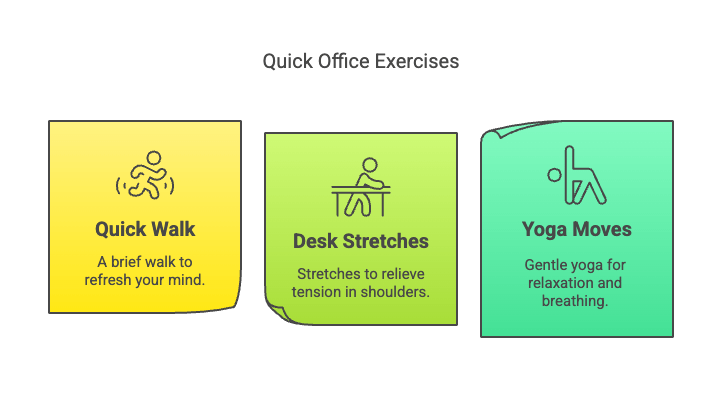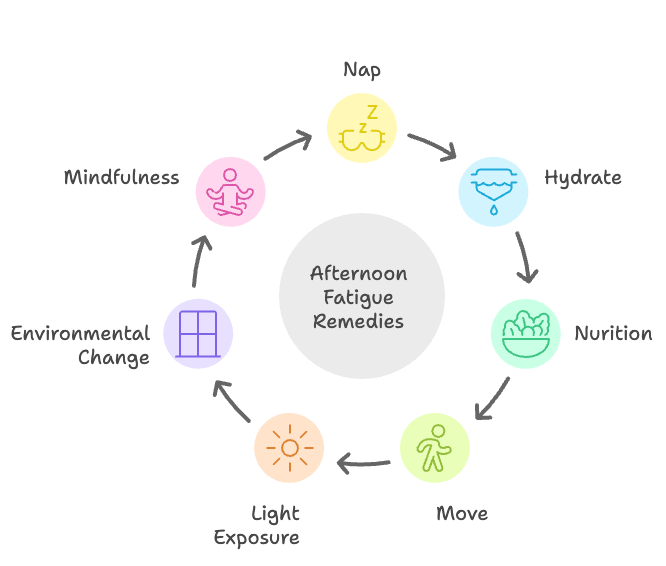Table of Contents
Looking for afternoon fatigue remedies that aren’t just another cup of coffee? You’re not alone. I used to be the guy nodding off during afternoon meetings, desperately reaching for my fifth coffee of the day. After countless energy drinks, questionable supplements, and weird “productivity hacks,” I finally discovered what actually works.
Here’s the thing – that afternoon slump isn’t just in your head. It’s biology. But contrary to what every energy drink company wants you to believe, the solution isn’t chugging more caffeine. I’ve tested dozens of afternoon fatigue remedies, and these seven science-backed solutions actually deliver.
Why You’re Hitting the Afternoon Wall
Before jumping into solutions, let’s understand what we’re up against.
Your afternoon slump is largely driven by natural biological rhythms. Your cortisol levels (that’s your alertness hormone) naturally dip in the afternoon, typically around 1-3 PM. This happens regardless of how productive your morning was or how much sleep you got. It’s part of your circadian rhythm – basically your body’s internal clock.
Another culprit? Adenosine – a sleep-regulating neurotransmitter that gradually builds up throughout your day. While caffeine temporarily blocks adenosine receptors, when it wears off, that accumulated adenosine suddenly binds to receptors, potentially causing an energy crash.
Then there’s what you ate for lunch. That sandwich from the cafe? If it’s heavy on refined carbs and sugar, you’ve just set yourself up for a blood sugar rollercoaster. Your glucose spikes, triggering an insulin release, and boom – blood sugar plummets, leaving you foggy-headed and reaching for another snack.
Dehydration plays a role too. Research shows even mild dehydration significantly impacts alertness and increases fatigue. Your cells need proper hydration for optimal function, including transporting nutrients and oxygen that support energy production and brain performance.
Now for the solutions that actually work:
1. The 30-Minute Power Nap Sweet Spot
When I tell people napping changed my productivity game, they usually laugh. But the science is solid on this one.
Clinical studies show that strategic naps ranging from 10-60 minutes can improve mood and reduce sleepiness for up to 4 hours afterward. The magic number? 30 minutes.
A 30-minute nap specifically improves memory encoding compared to no nap at all, offering cognitive benefits beyond just feeling more alert. It’s the sweet spot – short enough to avoid sleep inertia (that groggy post-nap feeling) but long enough to deliver real benefits.
Can’t swing 30? Even a 5-10 minute power nap helps. Just set an alarm, find a quiet space, and embrace the quick recharge.
2. Rethink Your Lunch Game
I used to grab whatever was convenient at lunch, then wonder why I felt like a zombie by 3 PM. Big mistake.
Your meal composition significantly impacts sustained energy. Whole foods, quality protein, and healthy fats help maintain stable blood sugar throughout the day, preventing those dreaded crashes associated with refined carbs and sugars.
What works for me:
- Protein + healthy fat + complex carbs (think: chicken with avocado on whole grain bread)
- Avoiding sugar-sweetened drinks like soda (they promise energy but deliver crashes)
- Swapping sugary snacks for options like plain yogurt with berries or nuts
If you need an afternoon pick-me-up, try black coffee, unsweetened iced tea, or a small piece of dark chocolate – they provide more balanced stimulation without the crash.
3. Hydration: The Simplest Fix You’re Probably Ignoring
When my afternoon fatigue was at its worst, I realized I was drinking almost no water between morning coffee and evening dinner. Game-changer alert: proper hydration dramatically impacts your energy levels.
Research confirms that adequate hydration is fundamental to cognitive function and energy regulation. Water helps transport nutrients and oxygen to cells while supporting optimal blood pressure and heart function. Early warning signs of dehydration include darker urine and increased thirst, which often precede fatigue.
My hydration hack: Keep a water bottle at your desk and aim to refill it at least twice before 3 PM. If plain water bores you, add cucumber slices, lemon, or a few berries – just avoid sugary additions.
4. The 5-Minute Movement Reset
When you feel that afternoon sluggishness creeping in, the last thing you feel like doing is moving. But that’s exactly what you need.
Brief physical activity effectively counteracts energy dips by increasing blood circulation and delivering more oxygen to your brain and muscles. It provides immediate energy while also offering a mental reset.
What works for me:
- A quick 5-minute walk (even just around the office or up and down stairs)
- Simple desk stretches that target tight shoulders and hips
- Gentle yoga moves combined with deep breathing

These practices increase blood flow while releasing physical tension from sedentary work. The combination of movement and mindful breathing activates your parasympathetic nervous system, promoting alert relaxation rather than sluggishness.
5. Light Exposure: Your Brain’s Natural Wake-Up Call
After months of afternoon fatigue, I noticed something: my energy tanked harder on cloudy days or when I was stuck in windowless meeting rooms.
Light exposure strongly influences alertness through circadian regulation. Research shows that bright light, particularly natural sunlight, signals your brain to maintain wakefulness. For afternoon fatigue, opening blinds or stepping outside provides a natural energy boost. When natural light isn’t available, light therapy lamps can offer similar benefits.
My light exposure hack: Position your workspace near natural light if possible. If not, take a quick outdoor break when you feel your energy dipping, or invest in a small light therapy lamp for your desk.
6. Environmental Refresh: Wake Up Your Senses
Sometimes beating afternoon fatigue is about changing your environment to snap your brain out of an energy slump.
Research with patients managing chronic conditions found that introducing sensory changes, such as using aromatic essential oils (particularly citrus scents), can provide novel neural stimulation that temporarily increases alertness.
What works for me:
- Changing work locations (moving from desk to a different space)
- Using citrus essential oils (orange or lemon work great)
- Listening to upbeat music for 5-10 minutes
- Splashing cold water on my face
These environmental modifications provide fresh neural stimulation that can temporarily boost alertness when you need it most.
7. Mindfulness: Train Your Brain to Manage Fatigue
I was skeptical about this one until I tried it consistently. Mindfulness meditation can significantly impact how your body responds to fatigue.
A neuroscience study using event-related potentials (ERPs) found that mindfulness practice can offset the negative effects of fatigue on emotional processing and neural activation. In the study, fatigued individuals who practiced mindfulness maintained responsiveness to emotional stimuli compared to non-mindfulness controls.
My approach:
- A quick 3-5 minute focused breathing session when fatigue hits
- Using guided meditation apps specifically for energy/focus
- Taking structured breaks before fatigue becomes overwhelming
Rather than pushing through periods of low energy, scheduling brief mental breaks allows cognitive resources to replenish. Healthcare professionals recommend frequent short breaks throughout the day rather than waiting until fatigue becomes severe.
The Bottom Line on Beating Afternoon Fatigue

Through personal trial and error (and plenty of sleepy afternoons), I’ve found that combining these approaches works better than any single solution. My go-to combo is proper hydration + a protein-rich lunch + a quick afternoon walk with some sunlight exposure.
The key is working with your body’s natural rhythms rather than fighting them. No amount of caffeine will overcome basic biology – but these research-backed approaches can help you maintain sustainable energy throughout your day.
What afternoon fatigue remedies work best for you? Drop a comment below – I’m always looking to add new science-backed techniques to my arsenal.


